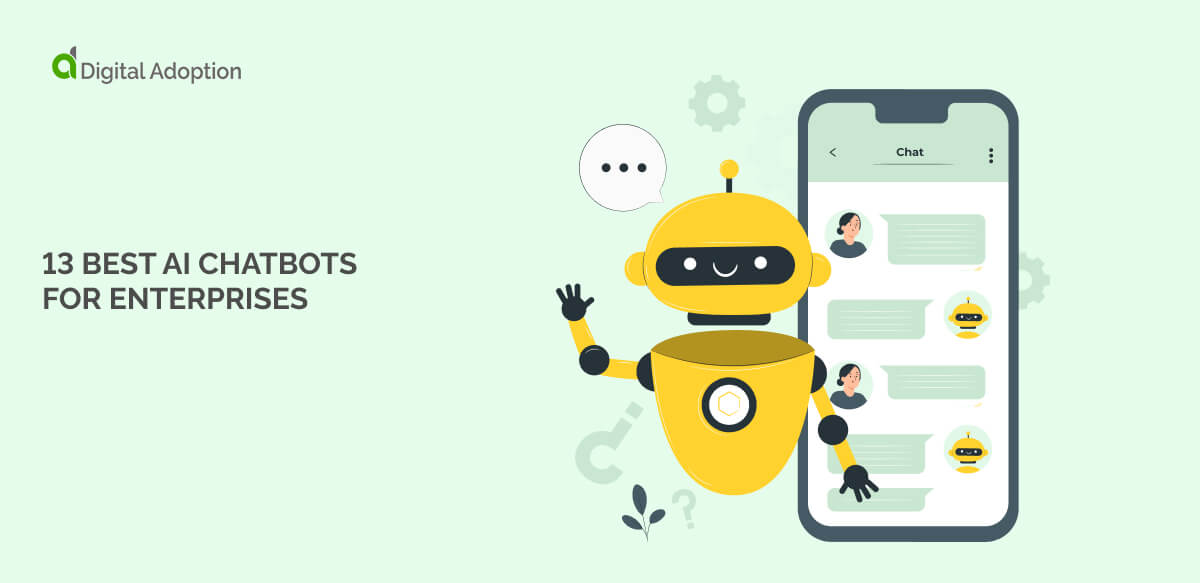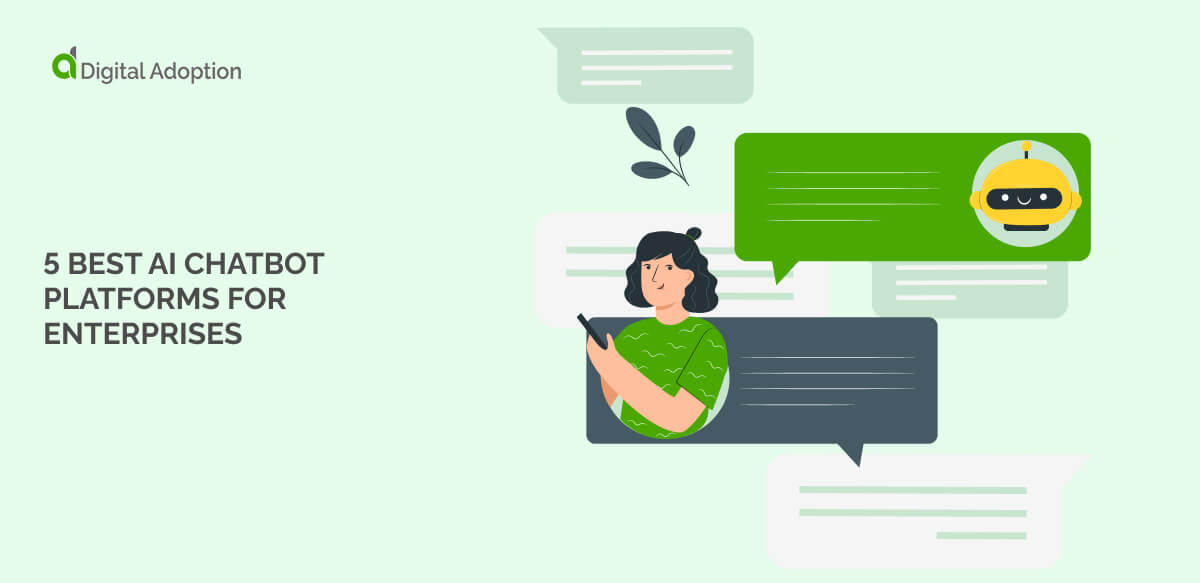Artificial intelligence (AI) has become a hot-button topic in recent years. With capabilities long thought unachievable, AI’s impact now extends beyond the pages of far-fetched science fiction novels.
Decades of developments in computer science have now made it possible to train computers to mimic intelligence in much the same way a human can.
Data availability has made AI’s potential possible. AI systems rely on these large data sets, which act as the building blocks underpinning their technologies.
With decades of patient data now at their fingertips, healthcare providers have all the pieces in place to leverage AI. From aiding diagnosis accuracy and supporting treatment recommendations, AI’s positive impacts in healthcare only work to cement its potential.
This article will explore AI in healthcare, how it’s being used, and real-world examples. We will also examine the benefits and challenges of AI in healthcare and the future of this thriving industry.
What is AI in Healthcare?
AI in healthcare involves utilizing computer systems trained on data to accelerate the speed and accuracy of healthcare capabilities.
AI systems are underpinned by key technologies, such as machine learning (ML), deep learning (DL), and natural language processing (NLP), to create faster and more reliable healthcare technologies.
These systems are a step from traditional healthcare software, with intelligent actions that identify patterns, contextualize language, and self-improve. For healthcare professionals globally, AI’s potential applications tease immense promise—potentially covering everything from earlier disease detection to personalized medicine.
Research shows that AI algorithms can now detect medical anomalies like tumors and diseases more accurately than healthcare professionals.
The National Library of Medicine “expects limited use of AI in clinical practice within five years and more extensive use within ten years.” However, they emphasize the degree to which it’ll be used, stating, “AI systems will not replace human clinicians on a large scale, but rather will augment their efforts to care for patients.”
How is AI being used in healthcare today?
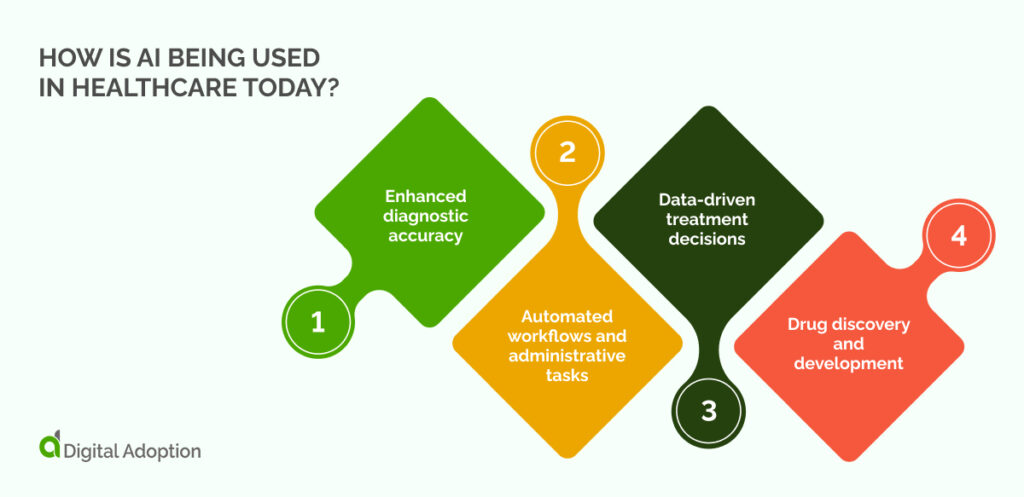
Research by Prudent Markets shows that the AI healthcare market was valued at USD 4.88 billion in 2020 and is projected to reach $ 88.26 billion by 2028.
While groundbreaking applications like robotic surgery and universal access to AI-powered healthcare remain beyond the horizon, AI’s impact on healthcare is already evident.
Here’s how AI is currently transforming healthcare today:
Enhanced diagnostic accuracy
AI algorithms can analyze medical images like X-rays, MRIs, and mammograms. This assists healthcare professionals in identifying subtle abnormalities that might be missed by the human eye, leading to earlier and more accurate diagnoses of diseases like cancer and heart disease.
Automated workflows and administrative tasks
AI can automate manual, time-consuming administrative tasks, such as scheduling appointments, generating reports, and managing patient records. Healthcare professionals can focus on enriching tasks like personalizing patient care and developing comprehensive treatment plans.
A new HETT report sheds light on a growing burden for UK healthcare professionals. The study surveyed 1,000 doctors, nurses, and other healthcare workers, revealing that they spend an average of 13.5 hours per week generating clinical documentation.
Data-driven treatment decisions
Instead of countless hours sifting through patient information, AI can analyze vast medical histories, genetic data, and lifestyle factors.
With this information, healthcare professionals can better understand their patients and make more informed treatment decisions backed by data. This potential can lead to improved treatment effectiveness and reduced side effects, truly reimagining patient care.
Drug discovery and development
AI increases drug discovery by analyzing vast molecular databases to identify potential drug candidates. This can significantly speed up the development of new medications to treat a wide range of diseases. AI can also predict how patients respond to different medicines, allowing for more targeted treatment plans.
Real-world examples of how AI is impacting healthcare
As we know, AI is making waves in its potential to enhance patient outcomes drastically.
Let’s explore some real-world examples:
1. The UK leverages AI for early lung cancer detection
The UK government has granted £21 million of funding to 64 NHS hospitals across England to introduce AI tools that speed up the diagnosis and treatment of lung cancer.
NHS employees can expect efficiency to increase and waiting times cut through AI tools that can analyze X-rays and CT scans. With over half a million monthly chest X-rays performed in England, AI is expected to help alleviate long-standing pressure on the NHS.
Elsewhere, over 90% of stroke networks in England are now using AI tools. This technology can cut treatment time in half for some patients, which means faster care and a better chance of recovery.
“AI is already being used in the NHS to halve treatment times for stroke patients and to assist doctors in analyzing brain scans, reducing the time between admission and treatment by more than one hour – saving valuable staff time and improving patient recovery,” says Steve Barclay, the UK’s Health and Social Care Secretary.
The UK government is investing significantly in healthcare with a £123 million boost for 86 different AI technologies.
AI tools like Brainomix e-Stroke speed up stroke diagnosis by an hour, potentially saving lives. Plus, a program called AI-Airlock lets hospitals test the latest AI tech before it’s officially approved, so patients get access to these advancements sooner. To ensure fairness for everyone, they’re also developing AI that uses diverse data to avoid bias.
2. FSU develops AI to help older patients understand test results
The US Department of Health and Human Services’ (HHS) Agency for Healthcare (AHRQ) gave a Florida State University-based research team the green light to go ahead and develop a new AI tool.
The HHS and AHRQ granted the FCU research team a $1 million grant to help older patients better understand and contextualize their medical test results. Dubbed “LabGenie,” this AI solution will also formulate potential questions patients can ask care providers to understand the bigger picture.
Made up of generative AI and large language models (LLMs), the research team at FCU categorizes its AI project into four main aims—all culminating in enhanced patient care and engagement.
In their project description, the FCU states, “Our long-term goal is to apply these novel technologies and approaches in the design of patient decision aids or patient portals to improve patient engagement and shared decision making among at-risk populations, with the ultimate goal of improving health outcomes.”
3. Scientists at Ohio State University use AI to mimic clinical trials
A team of scientists at Ohio State University is developing an AI system capable of mimicking clinical trials to identify potential treatments for stroke prevention.
The researchers leveraged huge non-identifiable data sets submitted by healthcare professionals to train the AI. Because of the huge input of generalized data, Ohio State scientists can teach the system to hone in on specific health conditions and simulate potential treatment options.
Researchers focused on simulating the causal effects of stroke-patient therapy along with tailored treatment recommendations.
Ruoqui Liu, PhD student of Professor Ping Zang at Ohio State, said, “Our model could be an acceleratory module that could help first identify a small group of candidate drugs that are effective to treat a disease, allowing clinicians to conduct randomized clinical trials on a limited scale with just a few drugs,”
What are the benefits of AI in healthcare?
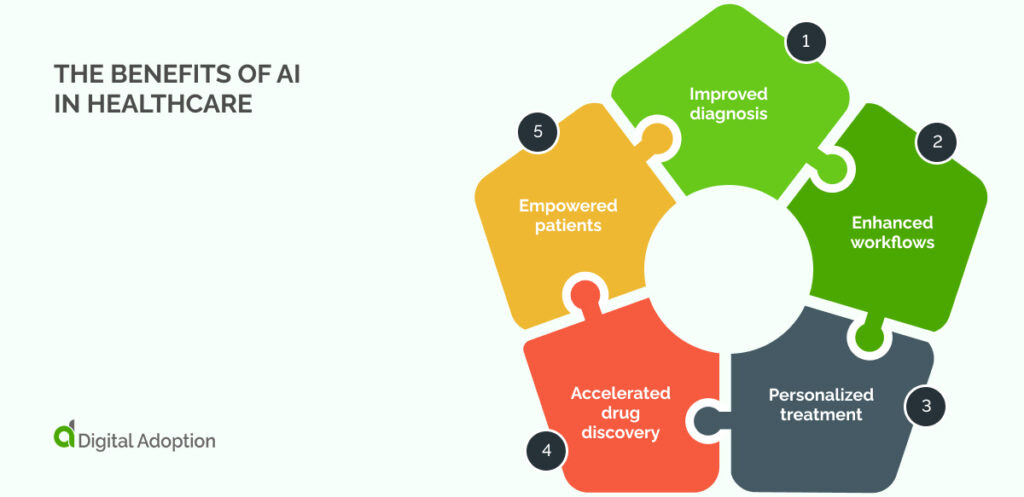
AI’s potential to transform healthcare is undeniable. From earlier disease detection to revolutionizing drug discovery, AI promises faster, more accurate diagnoses and highly personalized treatment plans.
Its ability to analyze vast amounts of data and learn complex patterns could lead to breakthroughs in patient care.
Let’s explore the incredible benefits AI could bring to the world of healthcare:
Improved diagnosis
AI excels at analyzing vast amounts of medical data. It can spot subtle problems in images like X-rays or MRIs that a human eye might miss. This leads to earlier and more accurate diagnoses, giving patients the best chance for successful treatment.
Enhanced workflows
AI takes over repetitive, time-consuming tasks. This includes scheduling appointments, filling out forms, and writing reports. Doctors and nurses gain back precious time to focus on what matters most: caring for patients.
Personalized treatment
AI doesn’t offer one-size-fits-all solutions. It analyzes a patient’s medical history, genes, and lifestyle to suggest the best treatments. This customized approach leads to better results and fewer side effects.
Accelerated drug discovery
Finding new medicines is slow and expensive. AI changes that. It can search enormous databases of molecules to identify potential drug candidates much faster than traditional methods.
Empowered patients
AI tools break down complex medical information. Patients can better understand their test results, diagnoses, and treatment options. This knowledge empowers them to be active partners in their own healthcare.
What are the challenges of AI in healthcare?
Before AI is implemented, material challenges, risks, and concerns must be addressed, especially in a field as significant as healthcare.
The potential for AI to make mistakes and hallucinate couldn’t be more dangerous. Even minor errors can have life-altering consequences for patients. Data and privacy concerns around patient data used to train and operate these AI systems also raise ethical questions.
Below, we explore common challenges that complicate AI’s influence in healthcare realms:
Accuracy isn’t guaranteed
Even sophisticated AI systems can make mistakes, especially if they learn from flawed or incomplete data. In healthcare, where lives are at stake, these errors raise significant concerns.
Data privacy is a major challenge
AI thrives on vast amounts of sensitive patient information. Ensuring this data is protected from breaches and misuse is crucial, raising ethical questions about ownership and control.
Building trust is essential
Patients and doctors may understandably hesitate to rely solely on AI recommendations, especially for critical decisions. Trust requires transparency, explainability, and a proven track record of reliability.
Understanding AI’s “black box” is a hurdle
It can be difficult to grasp how AI algorithms reach conclusions. This lack of transparency can make it difficult to explain decisions, identify biases, and ensure accountability.
Regulation needs to adapt
The rapid pace of AI development challenges existing laws and guidelines. Clear rules are required to balance innovation with patient safety and ethical considerations.
AI in healthcare going forward
The relationship between AI and content creation or marketing does not hold the same weight as it does for healthcare. Medical decisions can—quite frankly—be the difference between life and death situations.
The Medicines and Healthcare Products Regulatory Agency (MHRA) in the UK recently announced its strategic approach to artificial intelligence (AI).
The strategy prioritizes both patient safety and continued industry innovation through 2030. This is achieved through a framework built on key principles, some of which include “safety, security, and robustness” alongside “fairness, accountability, and governance.”
AI systems are still prone to the many concerns and challenges are known today. Unchecked privacy concerns, bias, and misinformation all pose risks and can lead to a cascade of negative consequences.
With Google recently stating that its Med-Gemini AI Beats GPT-4, implementing AI in healthcare seems like a no-brainer. Their AI-powered healthcare models have demonstrated the ability to understand patient health stories, including how symptoms unfold.
If designed right, the benefits to global medical care are immeasurable. With trust in AI established, healthcare professionals will be empowered to fast-track innovation and ultimately delve deeper into exploring life sciences.

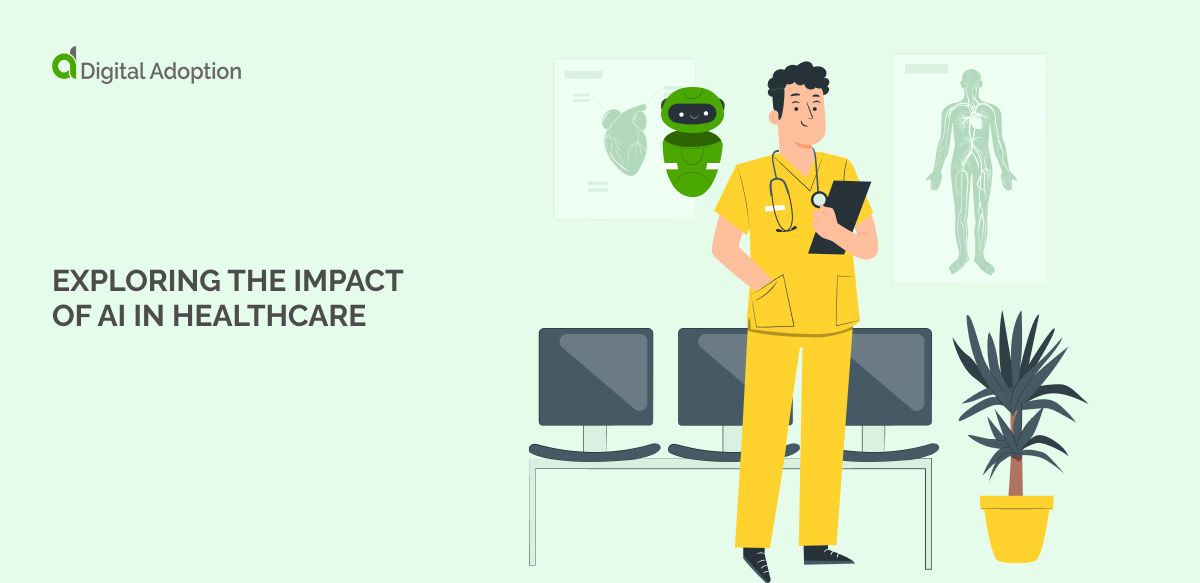


![4 Best AI Chatbots for eCommerce [2025]](https://www.digital-adoption.com/wp-content/uploads/2025/03/4-Best-AI-Chatbots-for-eCommerce-2025-img-300x146.jpg)


![13 Digital Transformation Enablers [2025]](https://www.digital-adoption.com/wp-content/uploads/2025/02/13-Digital-Transformation-Enablers-2025-img-300x146.jpg)



![4 Best AI Chatbots for eCommerce [2025]](https://www.digital-adoption.com/wp-content/uploads/2025/03/4-Best-AI-Chatbots-for-eCommerce-2025-img.jpg)
